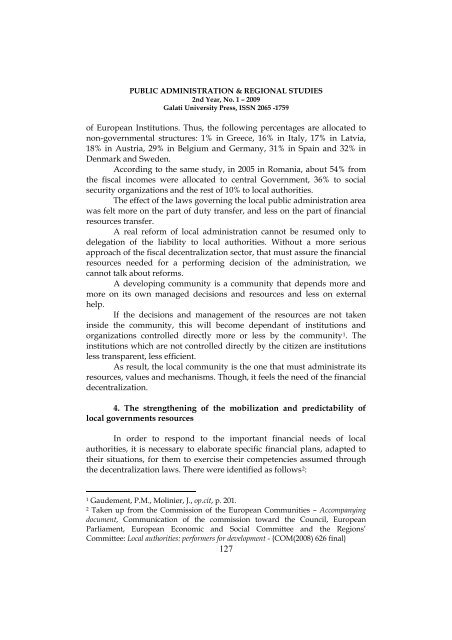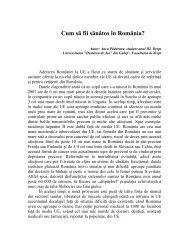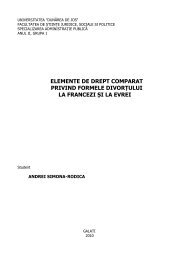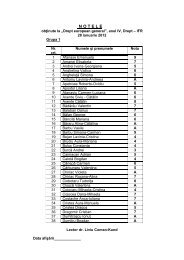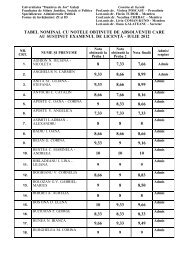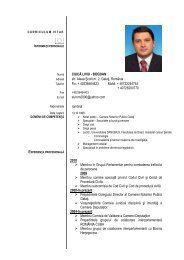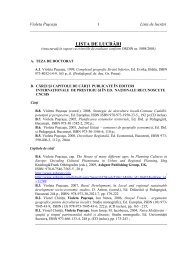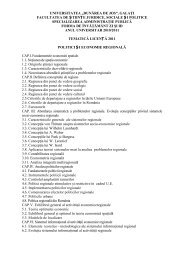regional studies public administration - Facultatea de Drept ...
regional studies public administration - Facultatea de Drept ...
regional studies public administration - Facultatea de Drept ...
You also want an ePaper? Increase the reach of your titles
YUMPU automatically turns print PDFs into web optimized ePapers that Google loves.
PUBLIC ADMINISTRATION & REGIONAL STUDIES<br />
2nd Year, No. 1 – 2009<br />
Galati University Press, ISSN 2065 -1759<br />
of European Institutions. Thus, the following percentages are allocated to<br />
non-governmental structures: 1% in Greece, 16% in Italy, 17% in Latvia,<br />
18% in Austria, 29% in Belgium and Germany, 31% in Spain and 32% in<br />
Denmark and Swe<strong>de</strong>n.<br />
According to the same study, in 2005 in Romania, about 54% from<br />
the fiscal incomes were allocated to central Government, 36% to social<br />
security organizations and the rest of 10% to local authorities.<br />
The effect of the laws governing the local <strong>public</strong> <strong>administration</strong> area<br />
was felt more on the part of duty transfer, and less on the part of financial<br />
resources transfer.<br />
A real reform of local <strong>administration</strong> cannot be resumed only to<br />
<strong>de</strong>legation of the liability to local authorities. Without a more serious<br />
approach of the fiscal <strong>de</strong>centralization sector, that must assure the financial<br />
resources nee<strong>de</strong>d for a performing <strong>de</strong>cision of the <strong>administration</strong>, we<br />
cannot talk about reforms.<br />
A <strong>de</strong>veloping community is a community that <strong>de</strong>pends more and<br />
more on its own managed <strong>de</strong>cisions and resources and less on external<br />
help.<br />
If the <strong>de</strong>cisions and management of the resources are not taken<br />
insi<strong>de</strong> the community, this will become <strong>de</strong>pendant of institutions and<br />
organizations controlled directly more or less by the community 1 . The<br />
institutions which are not controlled directly by the citizen are institutions<br />
less transparent, less efficient.<br />
As result, the local community is the one that must administrate its<br />
resources, values and mechanisms. Though, it feels the need of the financial<br />
<strong>de</strong>centralization.<br />
4. The strengthening of the mobilization and predictability of<br />
local governments resources<br />
In or<strong>de</strong>r to respond to the important financial needs of local<br />
authorities, it is necessary to elaborate specific financial plans, adapted to<br />
their situations, for them to exercise their competencies assumed through<br />
the <strong>de</strong>centralization laws. There were i<strong>de</strong>ntified as follows 2 :<br />
1 Gau<strong>de</strong>ment, P.M., Molinier, J., op.cit, p. 201.<br />
2 Taken up from the Commission of the European Communities – Accompanying<br />
document, Communication of the commission toward the Council, European<br />
Parliament, European Economic and Social Committee and the Regions’<br />
Committee: Local authorities: performers for <strong>de</strong>velopment - {COM(2008) 626 final}<br />
127


